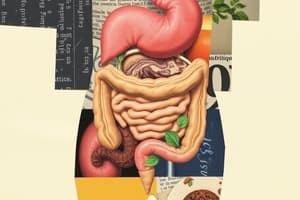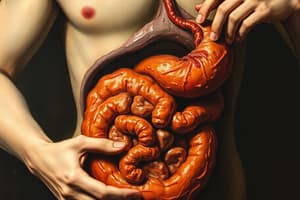Podcast
Questions and Answers
Which of the following is NOT a type of nutrient essential for human growth and development?
Which of the following is NOT a type of nutrient essential for human growth and development?
- Fibers (correct)
- Fats
- Proteins
- Carbohydrates
The process of assimilation involves the absorption of digested food by the cells of the body.
The process of assimilation involves the absorption of digested food by the cells of the body.
False (B)
What is the function of the tongue in the digestive process?
What is the function of the tongue in the digestive process?
The tongue helps in swallowing food, mixing food, detecting tastes, and speaking.
The long, membrane-lined tube from the mouth to the anus is called the __________.
The long, membrane-lined tube from the mouth to the anus is called the __________.
Match the types of teeth with their functions:
Match the types of teeth with their functions:
What is the primary function of the incisors?
What is the primary function of the incisors?
The salivary glands secrete saliva that contains the enzyme salivary amylase.
The salivary glands secrete saliva that contains the enzyme salivary amylase.
What is the purpose of the tongue in the digestive process?
What is the purpose of the tongue in the digestive process?
The last molar on each side of the jaw is referred to as the __________.
The last molar on each side of the jaw is referred to as the __________.
Match each type of tooth with its primary function:
Match each type of tooth with its primary function:
Flashcards are hidden until you start studying
Study Notes
Nutrition in Human Beings
- Nutrition involves obtaining food for energy, growth, and body repair.
- Nutrients are classified into five types: carbohydrates, proteins, fats, vitamins, and minerals.
- The five steps of nutrition are ingestion, digestion, absorption, assimilation, and egestion.
The Digestive System
- Comprised of the alimentary canal and digestive glands.
- Alimentary canal: A tube from the mouth to the anus including the mouth, esophagus, stomach, small intestine, large intestine, rectum, and anus.
- Digestive glands: Include salivary glands, liver, and pancreas, linked to the alimentary canal.
Mouth and Initial Digestion
- Digestion begins in the mouth where food is chewed by teeth and mixed with saliva.
- Saliva contains salivary amylase, which digests starch into sugars.
Tongue Functions
- A muscular organ aiding in swallowing, mixing food, detecting taste, and speaking.
Types of Teeth
- Incisors: Cutting and biting (four upper and four lower).
- Canines: Tearing food (two per jaw).
- Premolars: Grinding (four upper and four lower).
- Molars: Chewing and grinding (six per jaw).
Dental Formula
- Dental formula for humans is 2123/2123. Milk teeth (20) emerge at 6-7 months, replaced by permanent teeth (32) by adulthood.
Taking Care of Teeth
- Brush teeth twice daily, floss, limit sugary foods, eat a balanced diet, and hydrate.
Oesophagus
- A muscular tube connecting the mouth to the stomach, facilitating food movement via peristalsis.
Stomach
- Hollow, muscular organ receiving food from the esophagus, mixing food with gastric juices containing hydrochloric acid and enzymes, starting protein digestion.
Small Intestine
- A 6-7 m long coiled tube divided into duodenum, jejunum, and ileum.
- Villi on its inner surface increase surface area for nutrient absorption.
Large Intestine
- 1.5 m long tube divided into caecum, colon, and rectum.
- Absorbs water and forms feces for egestion via the anus.
Role of Salivary Glands
- Three pairs secrete saliva, which moistens food, aids in digestion, and protects against bacteria.
Liver and Pancreas
- The largest gland; produces bile stored in the gallbladder for fat digestion.
- Pancreas secretes pancreatic juice, containing enzymes for further digestion in the small intestine.
Digestion Process
- Involves mechanical and chemical breakdown of food into absorbable nutrients.
- Salivary amylase breaks down starch; pepsin breaks down proteins in the stomach.
Absorption
- Villi in the small intestine absorb nutrients into blood and lymph.
- Large intestine absorbs water, leading to the formation of feces.
Assimilation
- The liver converts excess glucose to glycogen, regulates energy use, and synthesizes proteins, contributing to body repair and growth.
Enzyme Functionality
- Enzymes are essential for digestion, acting as catalysts in breaking down food into simpler molecules that the body can absorb effectively.### Digestive Enzymes and Their Functions
- Salivary amylase is released in the mouth, breaking down starch into maltose.
- Pepsin is produced in the stomach, converting proteins into proteoses and peptones.
- Pancreatic amylase functions in the duodenum, converting starch to maltose.
- Trypsin, also in the duodenum, further digests proteins into polypeptides.
- Lipase, secreted in the duodenum, breaks down fats into fatty acids and glycerol.
- Erepsin, found in the ileum, transforms peptones and peptides into amino acids.
- Maltase in the ileum converts maltose into glucose.
- Sucrase in the ileum breaks down sucrose into glucose and fructose.
- Lactase processes lactose in the ileum, yielding glucose and galactose.
Importance of Digestive Health
- A healthy digestive system is crucial for overall well-being and an active lifestyle.
- Poor digestive health can lead to various gastrointestinal issues and discomfort.
Indigestion (Dyspepsia)
- Indigestion manifests as upper abdominal discomfort during or after meals, with symptoms like fullness, pain, heartburn, and nausea.
- Common causes include:
- Overeating, which overloads the digestive system.
- Eating too quickly, preventing proper food breakdown.
- Consumption of fatty or greasy foods that take longer to digest.
- Intake of spicy or acidic foods that irritate the stomach lining.
- Lifestyle factors like smoking, alcohol, and caffeine, which stimulate stomach acid production.
- Psychological factors, such as stress, impacting digestion negatively.
- Use of certain medications that can irritate the stomach.
- Underlying medical conditions like peptic ulcers and gallstones.
Unhealthy Food Habits
- Excessive junk food intake leads to weight gain and associated health risks due to high fats and sugars.
- A diet low in fruits and vegetables can cause vitamin, mineral, and fiber deficiencies, contributing to digestive issues.
- Skipping meals disrupts metabolism and can lead to overeating later.
- An unbalanced diet lacking essential nutrients results in nutritional deficiencies.
- High sugar consumption is linked to weight gain and chronic diseases, including diabetes and heart disease.
- High intake of unhealthy fats raises cholesterol and increases heart disease risk.
- Insufficient hydration can lead to dehydration and affect bodily functions.
Studying That Suits You
Use AI to generate personalized quizzes and flashcards to suit your learning preferences.




